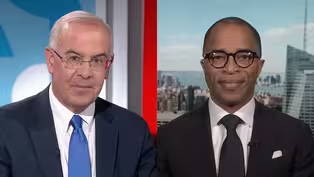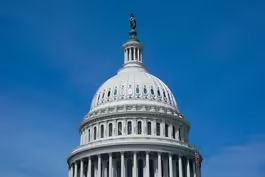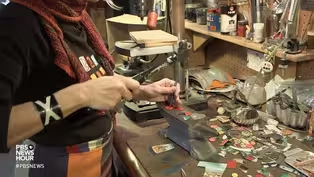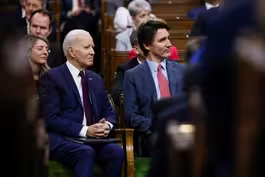
Iraqi identity and trauma 20 years after U.S. invasion
Clip: 3/24/2023 | 4m 11sVideo has Closed Captions
Archive project explores Iraqi identity, trauma 20 years after U.S. invasion
This week marks 20 years since the U.S. invasion of Iraq, and many are still piecing together what happened in those days and the years that followed. Researcher Sana Murrani joins Yasmeen Alamiri to discuss "Ruptured Domesticity," a project that collects Iraqis' memories and artifacts of the war and how they held onto the concept of home.
Problems playing video? | Closed Captioning Feedback
Problems playing video? | Closed Captioning Feedback
Major corporate funding for the PBS News Hour is provided by BDO, BNSF, Consumer Cellular, American Cruise Lines, and Raymond James. Funding for the PBS NewsHour Weekend is provided by...

Iraqi identity and trauma 20 years after U.S. invasion
Clip: 3/24/2023 | 4m 11sVideo has Closed Captions
This week marks 20 years since the U.S. invasion of Iraq, and many are still piecing together what happened in those days and the years that followed. Researcher Sana Murrani joins Yasmeen Alamiri to discuss "Ruptured Domesticity," a project that collects Iraqis' memories and artifacts of the war and how they held onto the concept of home.
Problems playing video? | Closed Captioning Feedback
How to Watch PBS News Hour
PBS News Hour is available to stream on pbs.org and the free PBS App, available on iPhone, Apple TV, Android TV, Android smartphones, Amazon Fire TV, Amazon Fire Tablet, Roku, Samsung Smart TV, and Vizio.
Providing Support for PBS.org
Learn Moreabout PBS online sponsorshipAMNA NAWAZ: This week marks 20 years since the U.S. invasion of Iraq, and many are still peace together what happened in those days and the years that followed.
"NewsHour" digital senior editor Yasmeen Alamiri spoke to Sana Murrani of the University of Plymouth in England about Ruptured Domesticity, a project that collects the memories and artifacts of Iraqis during the war, and how they held on to the concept of home.
YASMEEN ALAMIRI: You headed up a multipart project, part of which is archiving these memories of the war of Iraqis who were living inside and outside the country during that time.
Can you talk to us a little bit about why you decided to pursue this project and what came of it?
SANA MURRANI, University of Plymouth: Something that I really wanted to understand is, what was happening across the country when Baghdad was getting bombarded during the 2003 invasion?
I had no idea.
We were in Baghdad, but I did not know what was going on in Mosul, what was going on in Basra, what was going on elsewhere.
So, the archive idea came because I really wanted the world to see this.
I wanted it to be the collective voice of Iraqis.
YASMEEN ALAMIRI: War is traumatic for everybody involved.
And when you have years, decades of war, what you end up with is generational trauma.
I wonder about how that enduring trauma has impacted the way that Iraqis interact with the country, but also their memory or their understanding of what it means to be Iraqi.
SANA MURRANI: Through the conversations that I have had with Iraqis from the north to the south of Iraq, they kept on coming back to this thing of, we never documented what was going on to us at the time.
We don't have records, especially during the 2003 invasion, when mobile phones and cameras, digital cameras, weren't readily available for people.
So, there was this thing of trauma that lingers, trauma that is carried with you.
And it resurfaces in very different ways.
It sometimes resurfaces in PTSD, which we have seen across the world happening with people engaged in wars in Iraq and elsewhere, but also in collective creative outlet of that, where you see a burst of cultural belongings and tendency to want to make change happen.
YASMEEN ALAMIRI: As an Iraqi who has lived outside of the country as well, what does it mean to you to be Iraqi?
SANA MURRANI: It changes.
So, I kind of remember, when I first came out of Iraq, when people used to ask me the question, my answer was very different to what is -- what it is now, right now.
I find it in the connections to the beautiful music, to the wonderful food that we have, to the language that is spoken from the gut, with passion, to the -- kind of the Iraqi humor that is retrieved and found and kind of emerges in your face in the darkest of times.
I see myself an Iraqi right in the center of all of that.
So it is a tapestry.
But I kind of feel that this is always going to be in the making.
It's never going to have a form or an end to its making.
And I love that about it.
But there is certainly a yearning for a home that I kind of thought that it's always going to be there and it's never going to fade for me.
AMNA NAWAZ: And that was just part of Yasmeen's conversation with Sana Murrani.
You can watch the full version and see more from Murrani's project online at PBS.org/NewsHour.
Albuterol shortage worsens after major manufacturer closure
Video has Closed Captions
Clip: 3/24/2023 | 6m 59s | Patients, medical providers struggle with worsening albuterol shortage (6m 59s)
Brooks and Capehart on the debate over school curricula
Video has Closed Captions
Clip: 3/24/2023 | 11m 18s | Brooks and Capehart on Trump’s legal woes and parents’ influence in schools (11m 18s)
House GOP advances controversial ‘Parents Bill of Rights’
Video has Closed Captions
Clip: 3/24/2023 | 10m 58s | House GOP advances controversial bill to increase parental control in schools (10m 58s)
How a couple in rural Indiana combats consumerism with art
Video has Closed Captions
Clip: 3/24/2023 | 5m 54s | How a couple in rural Indiana uses art to combat consumerism and waste (5m 54s)
How Biden and Trudeau’s border deal affects asylum-seekers
Video has Closed Captions
Clip: 3/24/2023 | 7m 1s | How Biden and Trudeau’s border deal affects asylum-seekers entering Canada (7m 1s)
Providing Support for PBS.org
Learn Moreabout PBS online sponsorship
- News and Public Affairs

FRONTLINE is investigative journalism that questions, explains and changes our world.

- News and Public Affairs

BREAKING the DEADLOCK sparks bold, civil debate on America’s toughest issues.












Support for PBS provided by:
Major corporate funding for the PBS News Hour is provided by BDO, BNSF, Consumer Cellular, American Cruise Lines, and Raymond James. Funding for the PBS NewsHour Weekend is provided by...




